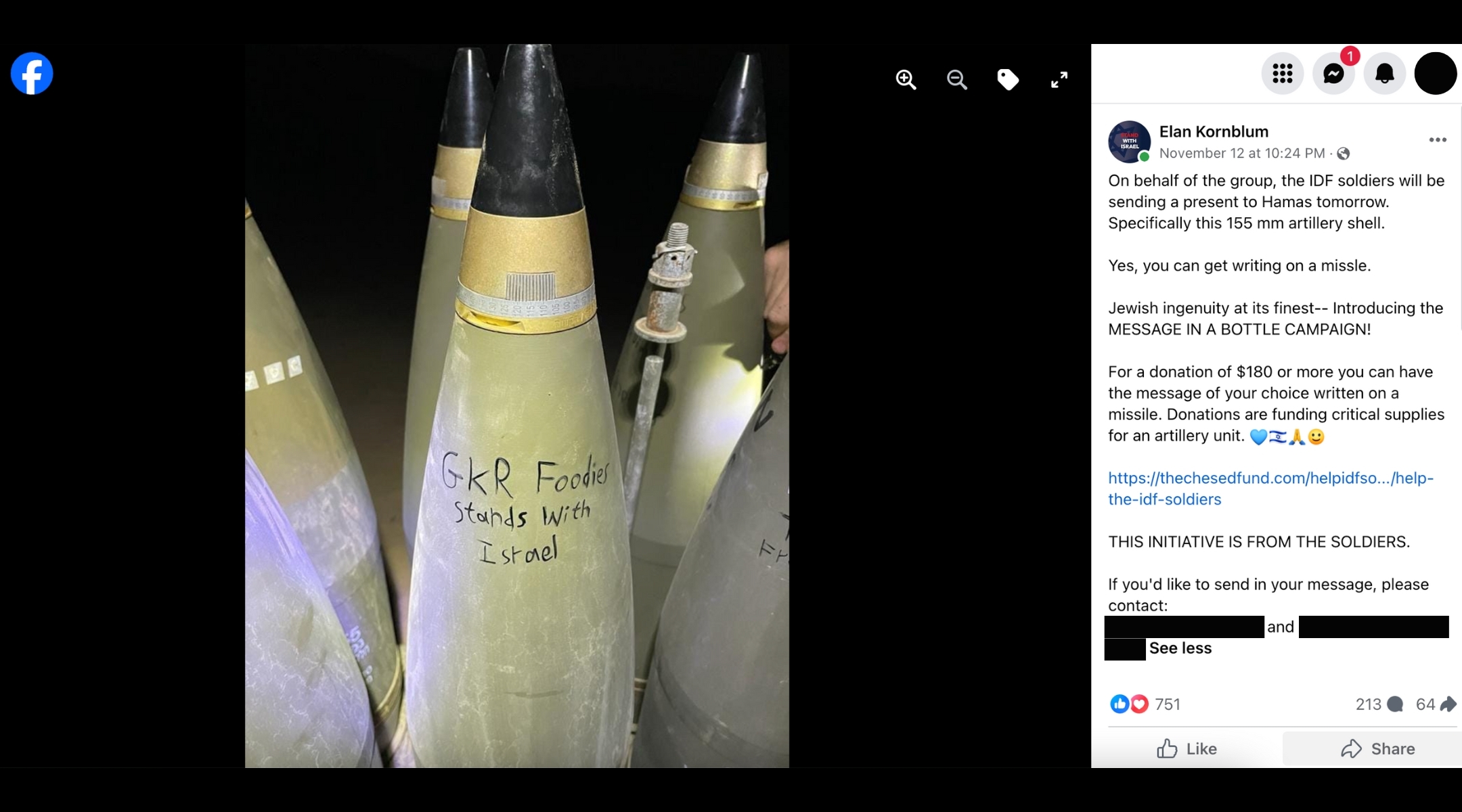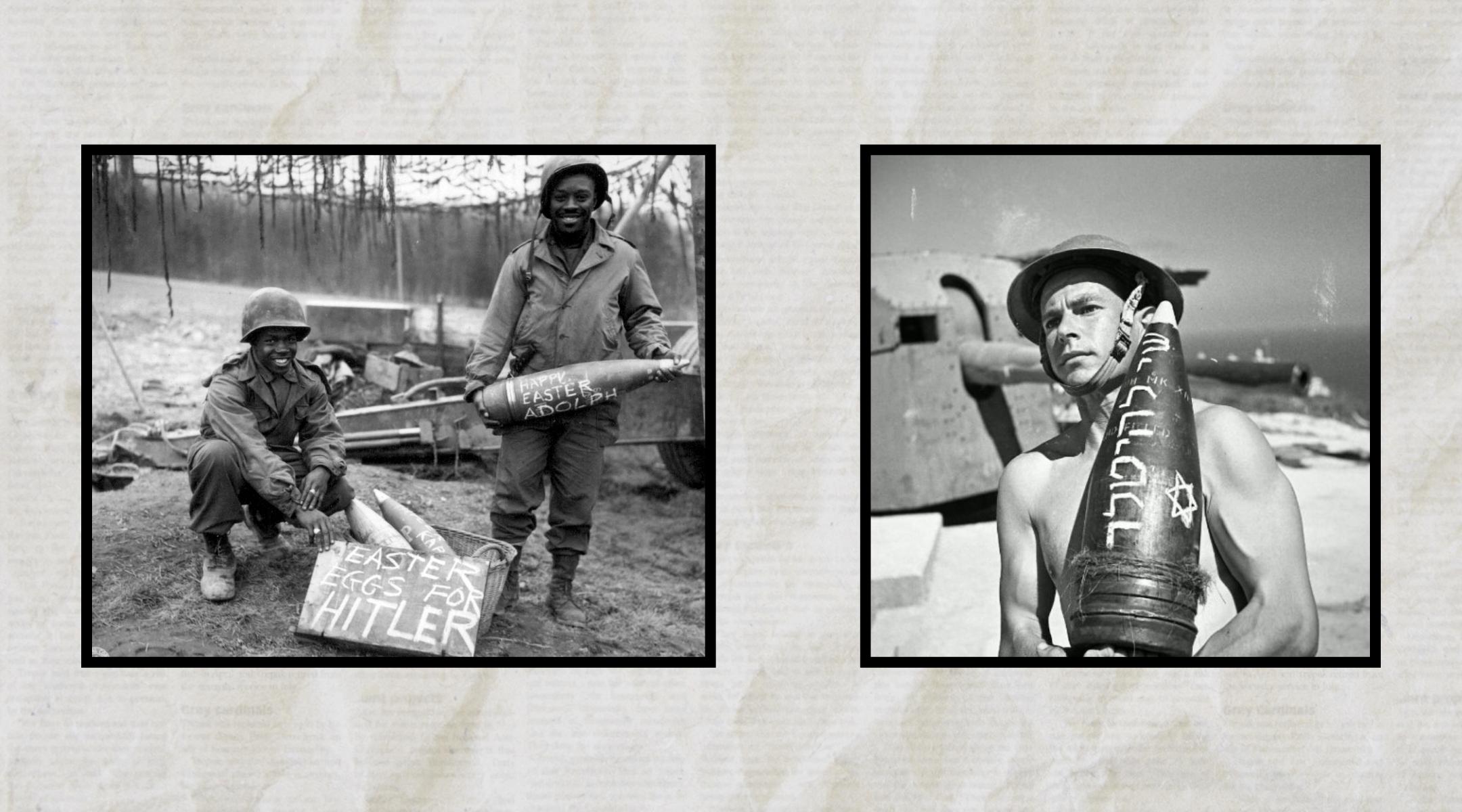Sponsoring Israeli missiles doesn’t fly for everyone in a Facebook group for ‘Kosher Restaurant Foodies’
“If somebody said, ‘Do you consent to being part of this?’ I would have said, ‘absolutely not,’” one group member said

A popular kosher food Facebook group became the latest battle scene for wartime ethics questions after a divisive post about missile messages tore the group apart for two days. (Screenshot via Facebook)
(JTA) — Elan Kornblum, the creator of the popular Facebook group Great Kosher Restaurant Foodies, has not been shy about marshaling the group’s 98,000 members in support of a charitable cause.
The group, whose usual fodder focuses on the quality of food (and rabbinic certification) at kosher restaurants around the world, has mobilized in response to extreme weather events, community members’ medical expenses and to feed the hungry. In the days following Hamas’ Oct. 7 invasion of Israel, it sent boxes upon boxes of food to JFK Airport, to be loaded onto specially chartered flights to Tel Aviv.
Five weeks later, though, the group erupted over another of Kornblum’s donations to Israel: an IDF artillery shell headed for Gaza that was scrawled with the text, “GKR Foodies stands with Israel.” Kornblum said he was able to get the message on the missile via a gift of $180 to an Israeli charity.
“On behalf of the group, the IDF soldiers will be sending a present to Hamas tomorrow,” Kornblum wrote in a post on Nov. 12. “Specifically this 155 mm artillery shell. Yes, you can get writing on a missle [sic]. Jewish ingenuity at its finest– Introducing the MESSAGE IN A BOTTLE CAMPAIGN!”
Kornblum wrote that the money would go to purchase supplies for soldiers. The public post received more than 750 likes and was shared more than 60 times outside of the group. But not everyone agreed that it was a good idea.
“I hate it,” one member said. Another replied to the post, “May Hashem have mercy on us all.”
The discussion over the fundraiser, which spawned more than 200 comments, is an example of how debate over the Israel-Hamas war has seeped even into Jewish spaces that are meant to be a sanctuary from the sometimes all-consuming political discourse on social media. And, in a forum composed largely of observant Jews, who tend to be more centrist and right-wing, on average, than American Jewry at large, it threw the fault lines of communal discussion into stark relief.
Some commenters objected to the fundraiser because they support a ceasefire — a calling-card of left-wing Jews. But even some who support Israel’s campaign in Gaza said they were uncomfortable with having the name of their Facebook group written on a weapon of war.
“If somebody said, ‘Do you consent to being part of this?’ I would have said, ‘absolutely not,’ and I would probably have a much stronger reaction,” said Daniel Saleman, a New Jersey-based accountant and member of Great Kosher Restaurant Foodies since 2015. “I had absolutely no say in it.”
Great Kosher Restaurant Foodies isn’t the only social media operation to find itself dealing with matters of war and peace post-Oct. 7. Jewish influencers whose content does not typically center around Israel have found their roles shift over the past six weeks, as they feel compelled to use their platforms to weigh in on the war.
“I feel a moral responsibility to speak about it, specifically because I don’t feel like anyone who is not Jewish does talk about it,” Morgan Raum, a Jewish food influencer with more than 150,000 followers on Instagram, told NBC News earlier this month. “If I’m not talking about it, who is?”
The “Foodies” Facebook group was born from a print magazine, Great Kosher Restaurants, that has since become an online guide to kosher dining options. The Facebook group has 10 administrators, including Kornblum, along with one moderator, all of whom manage group membership, settings and posts.
Many dissenters on Great Kosher Restaurant Foodies objected to the tone of the post. Saleman commented that the post was “in poor taste.” He added that because the post settings were public, it could be used as anti-Israel propaganda. Other commenters shared similar sentiments.
Comments on the post called it “very misguided and in terrible taste,” and “abhorrent and gut wrenching.” A member who said they were a parent of two Israeli soldiers wrote, “Let’s not glorify war, let’s not make light of the war that is being fought for our country and our people.” Another group member wrote, “This is one of the most horrific things I have ever seen. That a Jew would do this.”
The backlash came quickly. Less than an hour after the post went up, Kornblum commented defending it. “I’ll say it again, IDF uses missles [sic] to destroy Hamas buildings and targets, it does not use it for civilians,” he wrote. “I can’t believe we need to explain that in this group.”
As discussion on the post devolved from criticism of the campaign to personal attacks on group members, Kornblum shut down the comments section, one of his tools when conversation gets too negative. He reopened the comment feed the following morning, then closed it down again — after posting another comment defending the missile message, at least his fourth since publishing the post.
“For the record, I’ll just note there are about 450 reactions on this post,” he wrote. “287 likes, 145 loves, 3 angry. We keep posts up dependent on what the group as a majority wants. I think the group has spoken. Thanks. Talk later.”
Kornblum told the Jewish Telegraphic Agency that he saw the donation as a standard way to demonstrate support for Israel at war — of a piece with the group’s other efforts.
“Being that we run the group and we stand behind Israel, this was my way of showing it,” Kornblum told JTA. He’s used the group’s name in other contexts such as deaths or lifecycle events, he said.
“A lot of times I’ll say, ‘On behalf of the group, we send condolences,’ ‘We send mazel tov,’” he added. “So when I speak on behalf of the group, it’s myself and my company and the group. So I thought it was a nice message.”
This is not the first time a message written on an Israeli rocket has spread online. On Oct. 29, the day after “Friends” co-star Matthew Perry died, an image of a rocket with the Hebrew message, “This one is for Chandler Bing,” appears to have first been shared on Instagram by comedian and digital creator Matan Zur, who is currently serving in the Israel Defense Forces. The image went viral when it was shared by Israeli tech blogger Hillel Fuld on X. That picture, too, generated backlash for making light of both the war and of Perry’s death.
Writing messages on rockets is a tradition that dates back at least to World War II. American soldiers in a Black platoon in 1945 famously posed for a picture with a basket of ammunition tagged with the words “Happy Easter Adolph.” Another famous photo from 1944 or 1945 shows Joseph Wald, who served in the Jewish Brigade of the British Army, holding an artillery shell bearing the Hebrew words “Gift for Hitler.”

Left: Technician Fifth Grade William E. Thomas and Private First Class Joseph Jackson pose with artillery shells on Easter morning, 1945; Right: Joseph Wald, a soldier in the Jewish Brigade of the British Army, holds an artillery shell inscribed with the words, “a gift for Hitler” in Hebrew, sometime in 1944 or 1945. (Images via Wikimedia Commons. Design by Jackie Hajdenberg)
And over the course of the Ukraine war, a project similar to the Israeli campaign run through SignMyRocket.com was created by Ukrainian information technology student Anton Sokolenko. The initiative has raised nearly $1.7 million dollars and written more than 5,100 messages across a variety of weapons, according to its website.
The donation page for the Israeli project, on the website of a charity called the Chesed Fund, says more than $12,000 has been raised for this particular fundraiser for IDF soldiers, which pays for protective gear. But the Chesed Fund did not respond to a JTA inquiry about the missile messages, and it isn’t clear from the webpage that having a message written on a bomb is an option. To tag a missile, donors must first donate through the webpage and then call one of two U.S. phone numbers to relay the proposed text. The phone numbers do not appear on the Chesed Fund site, and the missile initiative has spread only through word-of-mouth and social media posts like Kornblum’s.
Kornblum is unfazed by the debate over his post. He said this was not the first time discussion on the group has veered away from its namesake subject, kosher restaurants. He has no regrets, says he would write the same post again, and added that if members left the group over the missile message, “that’s totally up to them, that’s OK.”
“I’m not afraid to talk about hot topics,” he said. “We do it a lot. We’ve spoken about the Pride Parade and we’ve spoken about BLM on the group, we’ve spoken about, obviously, COVID.”
Saleman, who objected to Kornblum’s post, agreed that discussion of the war wasn’t necessarily out of place in the Facebook group.
“You can’t really separate Jewish culture and kosher food and Israel,” he said. “So obviously, as things are happening in Israel, it makes sense that there are definitely certain portions of the group that are kind of dedicated to that.”
And he said he’d seen more contentious arguments between the group’s users — about condiments.
“There’s definitely lots of controversy but it’s not this type of controversy,” Saleman said. “People can get very heated about charging for spicy mayo. And the people have probably gotten more heated about that than they did about the bomb thing.”
This article originally appeared on JTA.org.


















